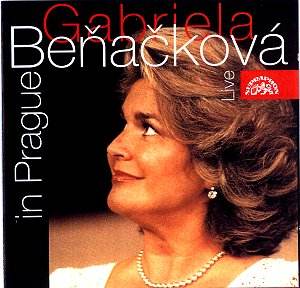In 1982-3 Supraphon recorded their digital Rusalka,
bringing to the fore a soprano whose light yet warm and expressive timbre
seemed made for the role and who provided the principal reason for buying
a recording which in many other ways failed
to match the standards of its predecessor under Chalabala. Though Beňačková
(to make life easier for us westerners, she usually drops the Čápová)
has not specialised in Czech music – a lovely, if not always idiomatic,
disc of Italian arias was made in 1986 – she has been particularly
associated with certain Czech roles and she has taken Rusalka
to places such as Vienna and New York where it had rarely or never been
seen before.
Those who heard (live or broadcast) her 1993 Rusalka
at the Metropolitan noted a marked darkening in the voice, a process
not dissimilar to that undergone by Mirella Freni, who also started
out with a light, golden timbre. Both of them seem to have come to terms
with the change in a similar way, opting for high notes seemingly dredged
up from below, providing security, plenty of "heft" and a
thrill of sorts. But whereas this is a reasonable enough way to sing
Freni’s latter day repertoire, Puccini and a smattering of veristi,
Beňačková aimed at far more and, as we can hear, by
1995 the results were far from happy.
The mixture of strenuous high notes and weird Italian
(Vordor mor dorvay? Is the closest I can get to the first Mozart
piece) mean that the opening items are better passed over. She is more
at home in Richard Strauss, without offering any particular illumination,
and the Ariadne excerpt lacks the luscious, creamy soaring one
expects of a Straussian soprano. Also, while I thought that Czechs of
her generation tended to learn German, however reluctantly, as a second
language (perhaps I’ve got this wrong), even here her vowels are, shall
we say, not quite those we are used to from native singers.
I certainly wouldn’t presume to pick holes in her Czech,
which constitutes the second part of the recital, but there are other
problems. The manner of production of high notes which has them billowing
up from below gives security of sorts but is too hard-hitting to be
effective in vocal chamber music. The trouble is, perhaps as a result
of years of militancy in opera houses a size too large for the voice,
when she takes the high note more delicately, from on high, it tends
to go sharp. Frankly, as the second half proceeds on its way the high
notes seem to get more and more strained, and almost consistently sharp.
Had she not the stamina to get through a 70-minute recital? The last
of the Gypsy Songs finds her practically screaming her top B
flat (the pianist, good elsewhere, goes in for some unsubtle bashing
at times in this cycle) and for encore we get a bumpy Ave Maria,
culminating in a far from effortless high A flat.
To judge from the ecstatic audience reception this
singer may have powers of communication not evident to the ear alone,
but I can only report what I hear. It gives me no pleasure to write
in this way about a soprano who enchanted me nearly twenty years ago.
Since this disc is a Ludwig, readers get three samples with which to
see if they agree with me. Take the opening
of the most famous of all Dvořák songs, “Songs my mother
taught me". (Track 21). Listen to how, in the first upward
ascent, the high note is not perfectly tied to the preceding note, the
listener (or at least this listener) is not carried up with it but perceives
it as a slap round the face and, finally, the note is sharp (this, surely,
cannot be a matter of opinion or of personal taste). Then hear the beginning
of "Vado, ma dove" (track 2) to decide whether the
Italian worries you or whether the general style seems to you to be
suited to the music. And finally, sample the beginning of the Ariadne
aria (track 8). On a disc, as opposed to a live recital, a Strauss excerpt
would have to be of imperishable quality, vocally and interpretatively,
to justify repeated hearings with a piano reduction of the score. Judge
for yourself if you find them here.
The booklet contains adulatory comments in four languages
but no texts. A recent school of thought is that this hardly matters
nowadays since you can download practically anything from Internet.
Well, if you can find texts and translations of Schneider-Trnavský’s
attractive cycle Drobné kvety on the Internet, you’re
a better man than I am.
Christopher Howell
